How Anthony ‘Lehmo’ Lehmann went from insolvency accountant to comedian
Anthony “Lehmo” Lehmann is one of Australia’s hardest working comedians, but he didn’t start out that way. He kicked off his career as an accountant. So how did he end up on our TV screens cracking jokes?
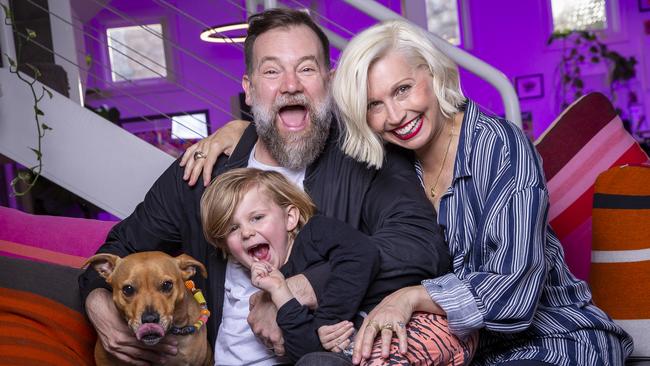
News
Don't miss out on the headlines from News . Followed categories will be added to My News.
I’m not sure the most natural progression for a comic is bouncing from Insolvency Accounting direct to stand up.
Anthony “Lehmo” Lehmann is one of Australia’s hardest working comedians — when he is able to.
We spoke about growing up in a small country town, the leap of faith needed to go from a job with a secure income and a clear pathway forward, to largely very little of either, a nickname he found tough to shake, the rush of performing, having full cans of beer thrown at him, sleeping on mates couches and making a meal of Red Faces.
HM: What’s the population of Peebinga?
AL: You’ve got two brothers, their wives, a dude who lives by himself in the next house, and then there’s the old town hall, which has been converted, and a guy lives there with his wife. That makes seven!
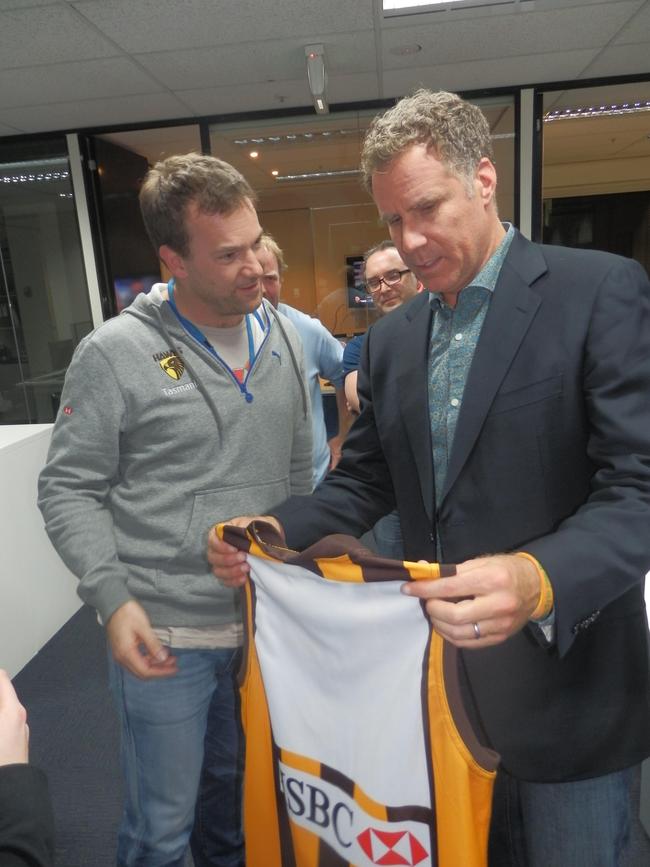
HM: What were your parents doing in Peebinga?
AL: They were on the farm. My brother, who’s still on the farm now, is a fourth-generation farmer. His son, Justin, was a fifth-generation farmer, but he’s just decided that it’s not for him. Farming has been in the family for about 100 years.
HM: I can’t really picture you in the drenching race or in the woolshed — but I assume that’s how you grew up?
AL: I was never really suited to farm life. I loved growing up there but I never had a desire to spend the rest of my life on the farm, and Dad helped with that. When I was at boarding school, I’d occasionally come home for a weekend or for holidays and Dad would have me doing the worst jobs on the farm — picking stumps, drenching sheep, fencing — and he’d say, “If you don’t study hard you’ll be doing this sh-- for the rest of your life!”
HM: Who gave you the nickname Turd?
AL: I can’t identify an individual brother, so I’m going to collectively give it to my three brothers. I’m the youngest, but they all decided that I was a little sh--, for whatever reason, and as we all know, a little sh-- is a turd. It stuck.
HM: You were at boarding school at Sacred Heart College, in Adelaide. I’m told you were a very good footballer.
AL: I don’t like to brag, but I will … I did win the West Adelaide U19 best and fairest.
HM: When I read that I thought it may have been a typo …
AL: I missed seven games in the season, but whatever … I won the club best and fairest, and my teammate, Craig Vozzo, won the competition best and fairest for the U19s — he’s now the footy manager for the West Coast Eagles. Neither of us really went on to make the most of any talent that we may or may not have had. I got lazy and ended up playing footy for Adelaide University in the amateurs, and just loved it.
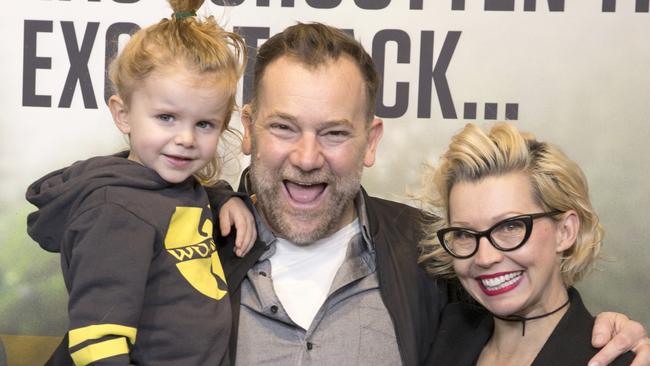
HM: I’ve watched a lot of games of Adelaide University, and I reckon I might have seen 291 on the back of some bloke one afternoon. What number did you wear?
AL: I actually had No. 6. Every registered player had a unique number! I remember one year there were players in the mid 300s running around! One day we were playing against a suburban team called Kilburn, who were pretty rough around the edges, and they had some pretty hard units as supporters that used to sit up on a hill, drink a keg of beer, watch the game, and heckle through a megaphone. One of our lower grade teams were playing there one day, and the guy on the megaphone says, “Hey, No. 196, is that your number or your IQ?”
HM: What did you study at university?
AL: I studied accounting at the University of South Australia. I came out of that and was always going to be an accountant. I didn’t really think that there were other options. I went into accounting, from memory, because Mum and Dad’s accountant had a good car.
HM: (laughs) … a career and life decided because your parents’ accountant drove a nice Camry?
AL: Exactly! It was only four years old and it was in really good nick. That’s enough for me!
HM: You ended up in London?
AL: A job in Adelaide first, and then ended up in London at Citibank for
18 months and Deutschbank for 18 months.
HM: How does that lead into stand-up?
AL: In Australia I’d just started doing stand-up before I left. I got to London as an open mic comic, and just really hit the rooms hard in London. I was working at banks, but also doing stand-up.
HM: How do you end up doing your first comic set on the basis that you’re a farm boy from Peebinga that went to Sacred Heart, played football, and studied accountancy?
AL: I was always a joke teller, and I loved having a laugh. There was a comedy club that I used to go to each week with some friends of mine, and we would watch the show and just loved it. Unbeknownst to me, a mate’s sister went up and put my name down for the next week, and she came back to me and said, “I put your name down for next week. You’re on”. I went away and wrote five minutes of material, did my first gig, which went amazingly well, and then that was just it for me.
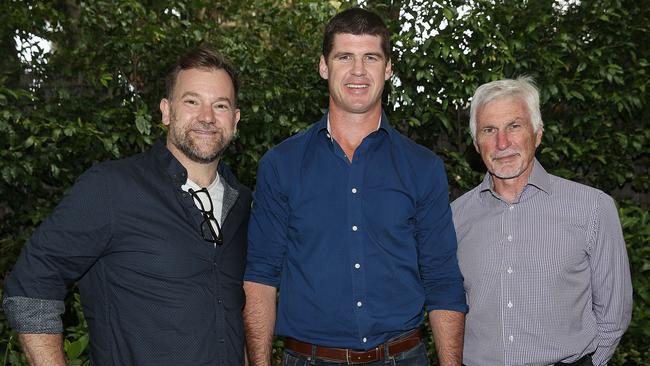
HM: What got you?
AL: People laughing at my jokes! It felt good. I’d been an accountant for four years …
HM: … let’s be specific about the accountancy — it was insolvency.
AL: I was in insolvency! No one was ever happy to see me — ever. If you saw me between 9 and 5 on a Monday through Friday, it was a bad day for you! But to get on stage, and actually make people happy — it was just a joy.
HM: How did the Londoners take to an Aussie on stage?
AL: In the mid ’90s there were three Aussies on the circuit, basically: me, Matt Hardy and Brendon Burns. It was a bit of a novelty to hear Australians, but the novelty factor has died off a bit. I just loved doing comedy in London, and just couldn’t get enough of it. I would work at the bank during the day, have a change of clothes with me, and then get changed and get the Tube to wherever the gig was that night.
HM: At what point do you say,
“I’m actually going to give up the accountancy and become a comic?”
AL: I decided that I would wait until
I had a bit of money in the bank, because deciding to become a full-time comedian is a risky proposition. The problem with me was, I wasn’t a very good accountant, so instead of me actually saving money, I was just slowly creeping further and further into debt. I thought to myself, “I’m never going to quit if I wait until I’ve got money in the bank, so I have to quit now!”.I quit when I was 32, and
in my first year as a stand-up comic I earned $12,000. I was having to sleep on friends’ couches around the country as I couldn’t afford anything else, but I bloody loved it.
HM: When did you end up on Red Faces?
AL: That was pre-London. I’d only done about five gigs! My spot on Red Faces was the sixth gig I ever did, and at the time, I was so sure of myself. I was like, ‘Yeah, cool — I’ll just go on and win $500, it’ll be easy, I have a solid little act”. I’d watched Red Faces, and some of those acts were terrible. I went on, and it was one of the worst things that has ever been on Australian television. It was horrific.
HM: Why?
AL: I wrote five minutes of new material.
HM: Rather than the tried and tested stuff you had up your sleeve from your long and successful five gig career, you went new?
AL: I thought using my existing stuff would have been weak! I did new material and it was just terrible. The producer said to me, “You’re from the country, you should dress a bit like you’re from the country and do jokes about the country”. Like the idiot I am, I said, “OK, if that’s what you think I should do”. I declined the offer, but he wanted me to chew hay! I had a flannel on, boots and everything. The jokes weren’t funny, and I wasn’t experienced enough to deliver them. Red gave me zero, Sofie Formica gave me one, and David Dixon gave me five. I’ve loved him ever since! Red and I are actually mates now and share the same office at Marios in Fitzroy.
HM: After $12,000 in the first year, sleeping on friends’ couches, when did you actually start to think, I might be able to make a fist of this?
AL: It started slowly improving. The next year was a little bit better, and then the year after that is when I was offered my first radio gig.
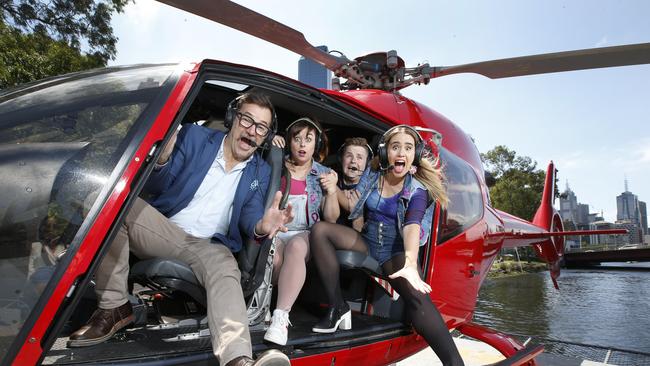
HM: Craig Bruce and SAFM?
AL: That’s right. I was offered that job in July of 2003. Things really started to improve for me on the media front.
HM: The night before you were going to start, Craig Bruce, who offered you the SAFM job on breakfast radio, called you.
AL: He said, “You don’t have to come on air tomorrow for the start, we will get you on for the last hour”. I thought I needed more content for the show, and Brett Lee’s band, Six and Out, were playing at the General Havelock Hotel. I went up there and ended up having a big night. I got up at about midday the next day, and I had 20 missed calls on my phone. Eventually I called back Craig Bruce, the boss, and he says, “What happened to you today?” I thought it’d be best to be honest and I told him that I had a really massive night and slept in.
HM: How was that taken by Craig?
AL: He said, “OK. Are you going to come in tomorrow?” And I said, “Yeah, I’ll be in tomorrow”. I was in the next day and didn’t have a sickie for the next 10 years after that!
HM: Is it true that you have done more gigs for our troops than any other comic in the country?
AL: I believe that’s right. I’ve been to the Middle East seven times, and East Timor. I love the gigs, and when the hecklers have guns, you always try a little harder! And I have come to develop a deep love and respect for our troops. I’ve also managed to push a lot of other comics into these gigs so they can share the joy!
HM: When did you first get asked to perform for the Australian troops?
AL: I was offered my first tour for the troops in 2005. I just jumped at it straight away. I know a number of comics have turned that particular trip down. There was an actual war happening around us for most of that trip. I remember in Baghdad you could hear gunfire 24 hours a day, plus the occasional bomb blast, and there were always at least six Black Hawks circling in the city skies.
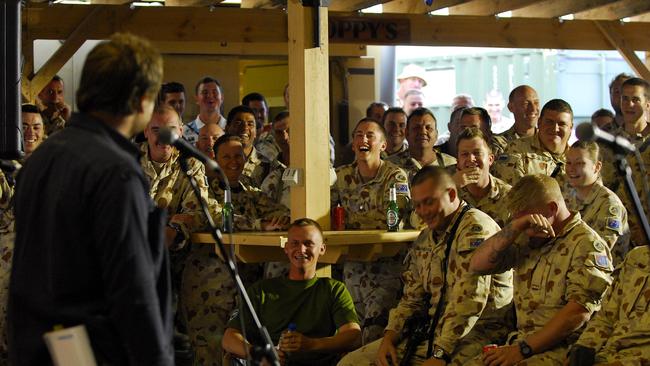
HM: Are they the best gigs you’ve done in terms of enjoyment?
AL: The outright best was in Tarin Kowt in 2009. We were at Poppy’s Bar, which is named after the first Aussie killed in Uruzgan Province. We ended up losing 41 soldiers. The Aussies had lost two young men that week of our show, and it was just the build-up of the grief around the loss of fellow soldiers, plus the isolation. There’s a general loneliness about living in the middle of the Afghan desert, so all of these things combined made for this huge release of tension and stress and created this unbelievable show. One of my favourite photos from my career is a picture taken from behind of me, and you can see all the troops laughing. A soldier came up to me at the end and said, “You took me back to Australia for two hours”. It gives me goose bumps now when I think about it. I love doing comedy anywhere, make no mistake about that, but when you get to do that, and make a genuine difference, it feels like you’re doing something worthwhile.
HM: How have you stayed connected with our defence personnel?
AL: Largely through work with Soldier On and Cam’s Cause, two great organisations that help support our wounded warriors. I’ve also developed a number of close personal friendships with current and former serving members.
HM: How does COVID destroy a comic’s year?
AL: COVID pretty much pushes a comedian’s year off the edge of a cliff. For the last 20 years I’ve always said, “If everything else goes tits up, I’ve always got stand-up”. There will always be a stage I can get on, there will always be a gig I can perform at, there’ll always be a footy club I can get up at. It turns out, I was wrong!
HM: Is it true that Jane Kennedy spotted your acting potential during a radio interview?
AL: Yes, Brigitte Duclos and I interviewed Jane promoting one of her cookbooks, and after the chat, she messaged me and asked if I’d be into an acting role. That was for Any Questions For Ben? and then came Utopia. I’m not exactly sure what Jane saw in that interview, but the support I’ve received from the Working Dog team has been incredible. And I get more positive feedback on Utopia than anything else I’ve ever done. Some people will stop me and say, “I hate you in Utopia” — which I’m sure is a compliment, my character is infuriating.
HM: If I say Falls Festival 2008, what springs to mind?
AL: Full beer cans and sore ribs! The tent I was performing in was running 30 minutes late. The festival-goers don’t have any tolerance or patience for stages not running on time, because they all quickly gather into one venue to watch an artist, and then they’ve got to rush off and catch an artist on a different stage. The stage was running 30 minutes late, and they weren’t happy about it. Danny McGinlay went out to introduce me, and everyone who was in the tent was there to see Lykke Li, a Swedish indie pop act, who was on after me. Danny goes out and says, “Lykke Li is coming out shortly”… everyone roars … “but first, some comedy!” … crowd boos. Danny started getting pelted with empty cans, and he was just the MC! He looked at me as if to say, “Do you want to dump this?” I looked at him as if to say, “Nah, this is fine — get me up there, I’ll win them over!” He introduced me and I walked onto the stage to a chorus of boos. From the first joke, I was getting pelted with empty beer cans. About five minutes into my set, I got hit in the ribs with a full can of beer, and my first thought was, “That really hurt!”. My second thought was, “That guy must really hate me, because the queue for a beer is about two hours long!”
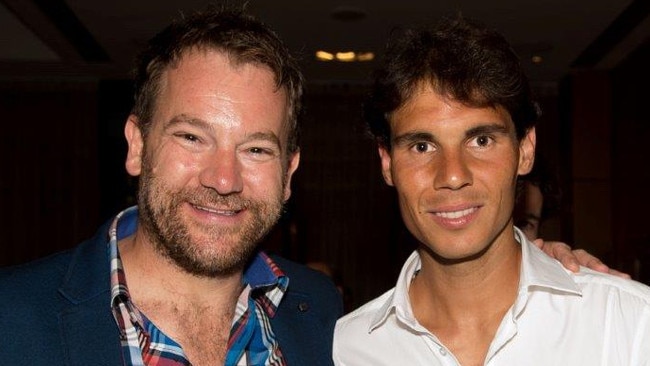
HM: Did you keep on trucking?
AL: At that point, I was determined to do my time. I’m going to make people really hate me. A chorus of, “Lehmo’s a wanker” started up in a large section of the crowd, and all of a sudden, I knew what it was like to be Richard Hadlee all those years ago. I have this memory of this one particular girl who was pushed up against the railing, right at the front, just staring at me completely exasperated. She yells at me, “What are you doing?” I just started doing really old, bad jokes, just to annoy the crowd. I came off the stage and there was a hip-hop act from Sydney called Snob Scrilla, and he looks at me and says, “Dude, that was dope!” I said, “Thanks, man”. I walked over to someone to ask them what that meant …
HM: We are living in times when it is easy to offend. Are you having to perform differently?
AL: Your material definitely evolves, but I have no issue with evolving my material. I’m very happy to have my own material move with the times. I reflect on some of my older jokes now and think, “That was a bit inappropriate”. I’m happy to keep my material as current as I possibly can with the demands of “PC culture”. It’s a good challenge to keep you on your toes and keep you sharp and aware of your audience as well.
HM: If it was your last set, full house, what’s the ultimate? Where’s Wimbledon centre court?
AL: I’d just choose a comedy club with a line-up of other comedians. For me, just sharing time out in the green room is also part of the joy of comedy. Maybe the Comedy Cellar in New York, or the Comedy Store in London. Something simple, but with another eight or nine comics on the bill.
HM: I saw a Seinfeld doco talking about how he spends years scripting a piece. He refines it, refines it, refines it. Sometimes years to get the line right!
AL: It can take years to get a bit right. Or sometimes you’ll put a bit to one side for a few years then come back to it and make it better. Rarely is a joke done right the first time you say it, it
takes time. Comics love it when a punter says, “I saw you six months ago and most of the jokes were the same. I thought you just made it up as you went”. Wouldn’t that be nice!
HM: Does the live work get easier?
AL: You mentioned that Seinfeld documentary; there’s a scene in it, I think it’s at a comedy club in New Jersey. He’s on stage and everyone in the room is talking — no one is listening to him! The most famous comedian in the world, and he just looks at the camera that’s off the side of the stage, and says, “How famous do you have to be?” It doesn’t matter who you are, if you’re not funny and you haven’t got the jokes, people don’t care. They want the next act! So, you get better at it but it never gets easier.
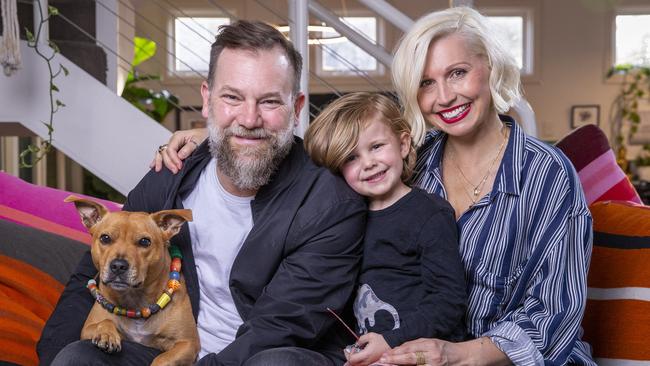
HM: Does your wife find you funny?
AL: Not as often as I’d like … I’ll test material on Kel, and I’ll do it one of two ways. I’ll say, “I’m testing material, what do you think of this?” I’ll give her the line, and she just stares back at me with a completely blank face. It’s the same face every time, and she’ll either say, “No, that won’t work” or “That’s really funny”.
HM: But no laugh?
AL: Never a laugh. The second way is I’ll try to squeeze in the joke over dinner, seamlessly. She’ll catch me out and say, “Are you testing material?”
HM: Yes, I am!
AL: When I proposed to Kel, we were in South Africa and we’d just been on a safari. We got back to our hotel room, I got her out on the balcony, and I got down to a bended knee. This was a shock to her because we’d always said, what do you gain from getting married? I’m delivering her this love speech before I propose, and during my love speech, she said, “I don’t understand what’s going on — this is really weird, why are you saying these things? Are you testing material on me?”
HM: And on the back of all of that, she said, OK.
AL: And here we are today.
READ MORE:
WHY JOHN BURNS WILL BE SIGNING OFF WITHOUT A FUSS
